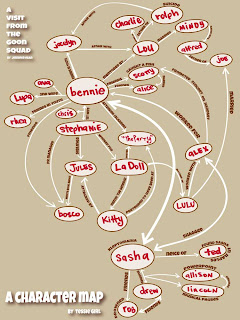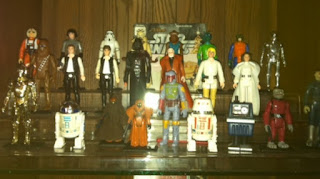Whaa-Whaa-Whaa
Inevitably at some point during a Peanuts cartoon, Charlie Brown's teacher squawks at him in her unmistakable trombdrone and Charlie or one of the other kids simply affirms, or translates, whatever it is Mrs. Donovan says.
'You want me to pound the erasers?'
Charlie Brown is a lovable misfit, the butt of many jokes, and he lives in a world of adults who cannot be understood to us except by children. Unless you are specifically writing for children - or maybe particularly if you are - don't treat your reader like Charlie Brown.
The last thing you ever want to hear someone say as they look up out of your novel is 'Good Grief!
Fiction is a communication device. Communication is a two way street. Likewise with your readers, your characters aren't mouth pieces or translators. For example - let's say the theme of your story is the decay of the American middle-class and the consequences of this locally, and/or nationally. You don't want your characters to simply relay this to your reader through heavy handed dialogue:
'The American middle class is crumbling. It used to be better.'
'I agree. In the past, we would have had better jobs than this.'
'Let's go drink.'
Or something. Let your theme, or whatever argument you're mounting speak for itself through the drama. The details of the world you build up on every page. The interactions of the characters. If your main goal is to use the novel and its equipment as a means of delivering a message or articulating a point, it's probably best suited to non-fiction. If your goal is to imagine a world reflective of an aspect of the reader's life they may or may not be conscious of, then the novel will speak for itself. This aspect of the reader's life - a death, a lost love, a fear of the unknown or rejection of the past - intersects us all somewhere in our lives. The best fiction reflects myriad aspects to different people at different stages of their lives - or different eras.
This isn’t limited to subjects like theme – often you will see theme broadcasted in dialogue or prose that shuns subtlety – so you don’t want to play the role of teacher, either. Grammar, style, etc. - these are tools. The goal isn't to make art of tools. It's to make art with tools. Avoid making your novel a textbook (or bully pulpit for that matter) on style, acrobatic as you may be.
Subtlety will be your best weapon. Forward thinking writers have been using it for centuries to sneak challenging thoughts and ideas past the thought police of their day. Read Joyce - and then keep reading him, again and again, and watch all the layers peel back.
See how a single word - 'nice' - repeated several times in 'The Dead' is used to exquisite effect. 'The Dead' is also an example of the intersection of theme. Nothing obvious here. Readers debate what 'dead' exactly he refers to. Leave your readers arguing. Give them nothing - let them find it for themselves.
'You want me to pound the erasers?'
Charlie Brown is a lovable misfit, the butt of many jokes, and he lives in a world of adults who cannot be understood to us except by children. Unless you are specifically writing for children - or maybe particularly if you are - don't treat your reader like Charlie Brown.
The last thing you ever want to hear someone say as they look up out of your novel is 'Good Grief!
Fiction is a communication device. Communication is a two way street. Likewise with your readers, your characters aren't mouth pieces or translators. For example - let's say the theme of your story is the decay of the American middle-class and the consequences of this locally, and/or nationally. You don't want your characters to simply relay this to your reader through heavy handed dialogue:
'The American middle class is crumbling. It used to be better.'
'I agree. In the past, we would have had better jobs than this.'
'Let's go drink.'
Or something. Let your theme, or whatever argument you're mounting speak for itself through the drama. The details of the world you build up on every page. The interactions of the characters. If your main goal is to use the novel and its equipment as a means of delivering a message or articulating a point, it's probably best suited to non-fiction. If your goal is to imagine a world reflective of an aspect of the reader's life they may or may not be conscious of, then the novel will speak for itself. This aspect of the reader's life - a death, a lost love, a fear of the unknown or rejection of the past - intersects us all somewhere in our lives. The best fiction reflects myriad aspects to different people at different stages of their lives - or different eras.
This isn’t limited to subjects like theme – often you will see theme broadcasted in dialogue or prose that shuns subtlety – so you don’t want to play the role of teacher, either. Grammar, style, etc. - these are tools. The goal isn't to make art of tools. It's to make art with tools. Avoid making your novel a textbook (or bully pulpit for that matter) on style, acrobatic as you may be.
Subtlety will be your best weapon. Forward thinking writers have been using it for centuries to sneak challenging thoughts and ideas past the thought police of their day. Read Joyce - and then keep reading him, again and again, and watch all the layers peel back.
See how a single word - 'nice' - repeated several times in 'The Dead' is used to exquisite effect. 'The Dead' is also an example of the intersection of theme. Nothing obvious here. Readers debate what 'dead' exactly he refers to. Leave your readers arguing. Give them nothing - let them find it for themselves.



Comments